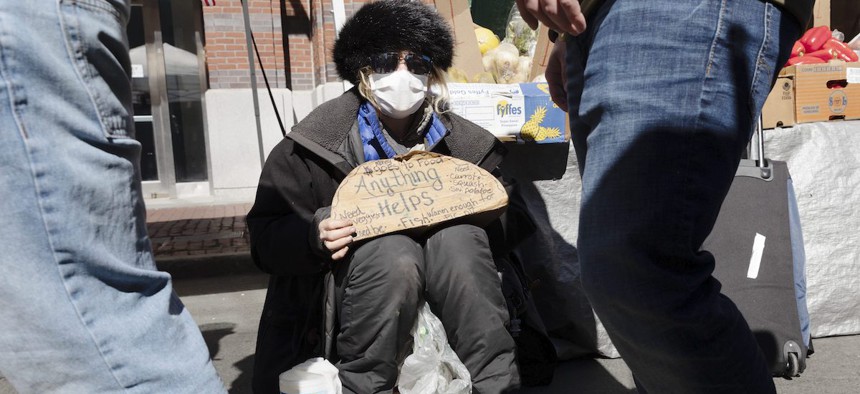Connecting state and local government leaders
Homeless people are particularly vulnerable to Covid-19. Cities are working to implement protective measures, often with no idea how they'll pay for it.
As the coronavirus spread throughout communities in California, officials in San Diego County focused on a daunting task: What could they do to protect populations of homeless people, who live in close quarters, lack access to health care and may find it logistically difficult to frequently wash their hands?
“We had no playbook for dealing with this novel virus,” Nick Macchione, director and deputy chief administrative officer of the county’s Health and Human Services Agency, said on a call with officials from the National Association of Counties. “We made one up.”
The county dispatched its public health nurses to canvass the community with law enforcement and homeless response teams, checking people for symptoms and, when appropriate, providing transportation to non-shelter beds for isolation and quarantine. It’s one of scores of ad-hoc solutions taking place across the country as officials race to protect people without homes from both contracting and spreading the virus. The challenge is particularly difficult given the inherent vulnerabilities of people living on the streets or moving from shelter to shelter..
“People who experience homelessness as individuals, not attached to families, are falling into the identified risk pools already,” said Samantha Batko, a senior research associate with the Urban Institute. “They have a larger disability rate than the general population, and higher rates of chronic health conditions. Obviously, people living outside have a lack of access to personal hygiene. The population is absolutely at risk for a variety of reasons, including the very nature of their living situations.”
There is no one set of best practices that local officials are working from, though most have attempted to find ways to help people obey federal health recommendations that encourage frequent handwashing and “social distancing”—or keeping a minimum of 6 feet away from other people. In San Francisco, city officials are using 30 recreational vehicles as temporary “isolation housing” for people who can’t self-isolate because they’re homeless or living in close quarters with others. In Mecklenburg County, North Carolina, officials leased a 123-room hotel for the same purpose. King County, Washington officials have worked to “decongest” large shelters by spreading people throughout existing spaces and shuttling more vulnerable clients—elderly people, those with pre-existing conditions—to recently purchased motel rooms for protection.
“We have also, in collaboration with Seattle and other jurisdictions, looked at finding additional space—not to result in additional shelter, but to allow for that social distancing that is so necessary,” Kate Speltz, a planner with the county’s Housing, Homelessness and Community Development Division, said on a media call this week.
Maintaining distances that are safe and help prevent spread of the respiratory illness comes with real challenges in shelters, said Rachel Heller, CEO of Citizens’ Housing and Planning Association in Boston. “As quarantine needs arise, we are working with our local and state-level partners to determine, where can people go so they can get better and also not spread infection?”
Homeless agencies are also ramping up cleaning measures. King County authorized additional funding for shelters to pay for extra janitorial work, Speltz said, which has been offered to all homeless shelters, not just the ones that currently contract with the county. The Pine Street Inn, a homeless shelter in Boston, has contracted with an outside cleaning service “to add another layer of daily deep cleaning in our buildings, with special focus on high-touch areas,” according to a March 17 statement.
All of that work takes place against the backdrop of the pandemic, which has shuttered other services, including day centers and public libraries, that offer respite to homeless people. Like other businesses, organizations providing services for homeless people have struggled with staff shortages, as employees fall ill or seek to protect themselves from the virus, leading some agencies to hire temporary workers while also funding sick leave for their full-time staff.
All of that comes without specific funding streams, and it’s unclear where money to help expand services may come from, Batko said. Some states are activating a patchwork of emergency funding to provide revenue streams specifically for mitigation measures within the homeless community. A proposed federal stimulus package could also direct dollars toward preventive measures at the state and local level. But most agencies are doing the work daily without knowing exactly how they’ll fund it on an ongoing basis.
“I think right now people are just doing things even without clear funding streams,” she said. “I don’t know anything firm and I’m not aware of any targeted funding for these projects.”
That’s an urgent problem, advocates said, and one that makes it difficult to form long-term plans to weather the duration of the crisis.
“We are behind where we need to be,” said Alison Eisinger, CEO of the Seattle/King County Coalition on Homelessness. “We need significant additional capacity and resources, and we need them yesterday.”
OTHER STORIES from Route Fifty:
-
States Postpone Elections, Explore Options for Mail-In Voting
-
Distilleries and Breweries Begin Manufacturing Hand Sanitizer Amid National Shortages
-
Public Officials Chastise Residents Who Aren’t Taking Social Distancing Seriously
-
Move by Fed May Help Shore Up Short-Term Borrowing for States and Localities
Kate Elizabeth Queram is a Staff Correspondent for Route Fifty and is based in Washington, D.C.

NEXT STORY: New York and California Governors Order Most People to Stay Home



